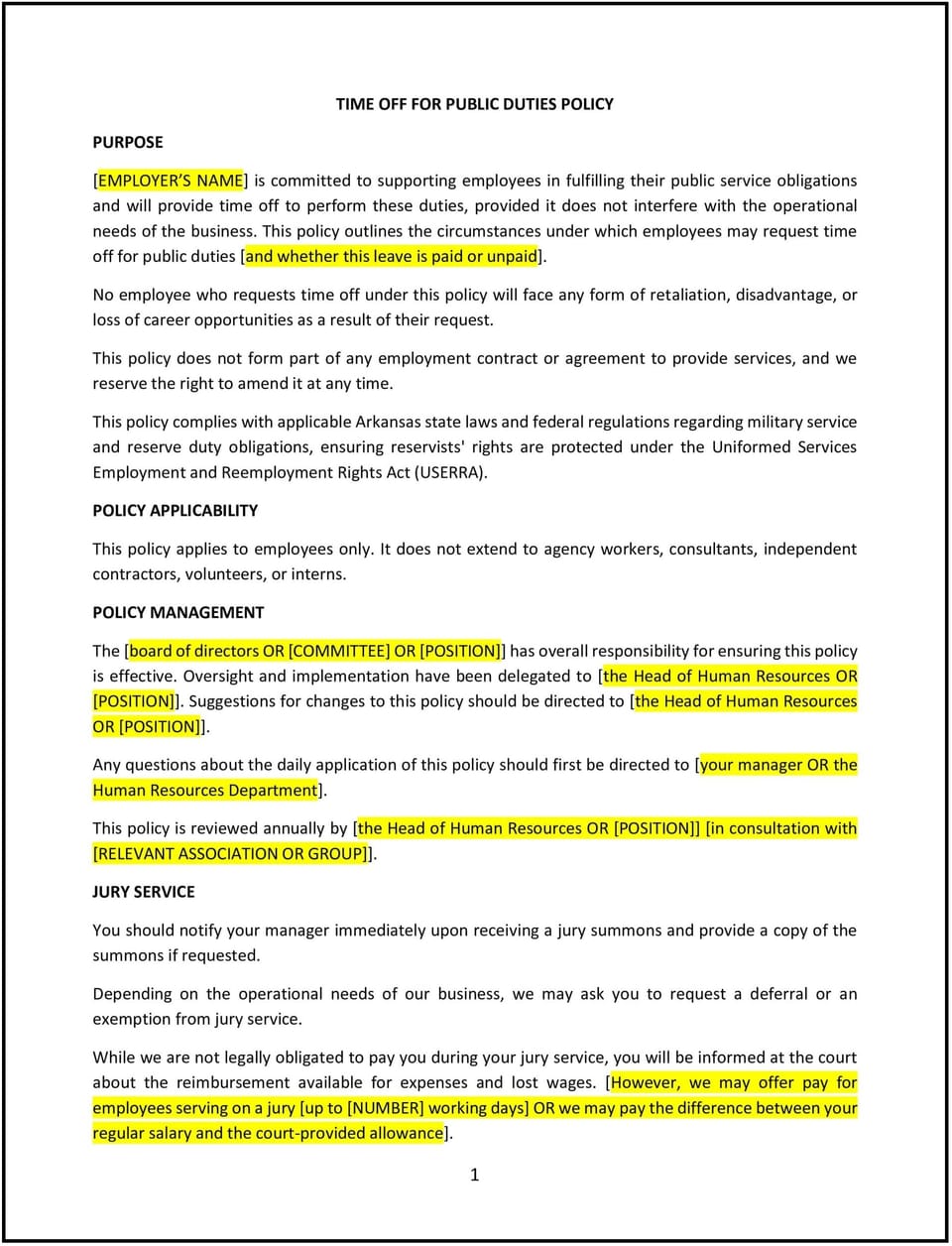Time off for public duties policy (Arkansas): Free template

Time off for public duties policy (Arkansas)
In Arkansas, a time off for public duties policy provides businesses with guidelines for managing employee absences related to public service obligations. This policy ensures that employees can fulfill their civic responsibilities, such as serving on a jury, attending court as a witness, or participating in community or government roles, while maintaining workplace productivity and compliance with applicable laws.
This policy outlines eligibility, procedures for requesting time off, and the terms under which such leave is granted. By implementing this policy, Arkansas businesses can support employees’ public service efforts while protecting operational efficiency.
How to use this time off for public duties policy (Arkansas)
- Define eligible duties: Specify the types of public duties covered under this policy, such as jury duty, witness attendance, or service in local government roles.
- Establish leave request procedures: Provide clear steps for employees to request time off, including notice periods and required documentation.
- Clarify leave terms: Outline whether time off for public duties is paid or unpaid, depending on the nature of the duty and business policies.
- Communicate expectations: Ensure employees understand their responsibilities, such as providing proof of attendance or notifying the business of schedule changes.
- Document absences: Maintain records of all public duty-related leave requests and approvals to ensure transparency and compliance.
Benefits of using this time off for public duties policy (Arkansas)
This policy offers several advantages for Arkansas businesses:
- Supports compliance: Aligns with Arkansas labor laws and federal requirements for granting time off for public duties.
- Promotes fairness: Provides consistent guidelines for handling leave requests related to civic responsibilities.
- Enhances employee trust: Demonstrates the business’s commitment to supporting employees’ civic engagement.
- Protects operational continuity: Establishes procedures to manage workloads during employee absences effectively.
- Builds community engagement: Encourages employees to contribute to their communities, reflecting positively on the business.
Tips for using this time off for public duties policy (Arkansas)
- Address Arkansas-specific considerations: Reflect state laws regarding mandatory time off for public duties, such as jury service.
- Communicate clearly: Ensure employees understand their rights and the process for requesting leave for public duties.
- Plan for absences: Develop strategies for managing workloads during employee absences, such as redistributing tasks or hiring temporary support.
- Maintain flexibility: Be prepared to accommodate unexpected or last-minute public duty obligations within reason.
- Review regularly: Update the policy to reflect changes in laws, workplace practices, or employee needs.
Q: How does this policy benefit the business?
A: This policy ensures compliance with Arkansas laws, supports employees’ civic engagement, and establishes clear procedures for managing public duty-related absences.
Q: What types of public duties are covered under this policy?
A: Eligible duties include jury service, witness attendance, or participation in local government roles, as specified in Arkansas laws and business guidelines.
Q: How does this policy support compliance with Arkansas laws?
A: The policy aligns with state requirements for granting leave for civic responsibilities while ensuring operational efficiency.
Q: What documentation should employees provide when requesting time off?
A: Employees should provide official documentation, such as jury summons, court orders, or other notices, verifying their public duty obligations.
Q: How can the business manage workloads during public duty-related absences?
A: The business can redistribute tasks, hire temporary staff, or cross-train employees to ensure minimal disruption during employee absences.
This article contains general legal information and does not contain legal advice. Cobrief is not a law firm or a substitute for an attorney or law firm. The law is complex and changes often. For legal advice, please ask a lawyer.


